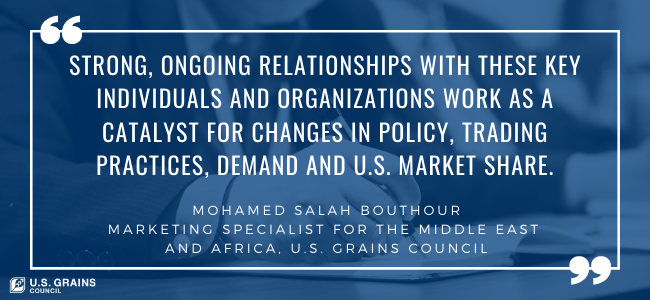Nine up-and-coming leaders across the Middle East and North Africa attended the Grain Procurement Management for Importers course at the Northern Crops Institute (NCI) at North Dakota State University in September. The U.S. Grains Council (USGC) sponsored participants from Morocco, Algeria, Oman, Jordan and Saudi Arabia, all of whom make key purchasing and procurement decisions within some of the largest feed- and livestock-producing companies in the region.
“These individuals are new and upcoming general managers or directors of the procurement departments at their respective companies,” said Mohamed Salah Bouthour, USGC marketing specialist for the Middle East and Africa. “Our engagement with them allows us to build new and close relationships with these key corn importers as they become the new leadership of their companies in the future.”
Conducted virtually for the first time, the course included two weeks of programming. In the first week, the team participated in pre-recorded lectures designed to improve the understanding of pricing and overall buying strategies. Each day, participants could also attend a live session to follow-up with mentors and ask questions on the topics discussed. The following week, attendees took part in a virtual tour of a U.S. grain export facility and barge loading facilities and met with U.S. corn producers.
“The course covered a host of topics particularly relevant to purchases in the Middle East and North Africa region, centered around the mechanics of grain purchasing, and there was an overview of the U.S. grain handling and marketing systems,” Bouthour said. “It is critical for our customers to be familiar with these systems and practices when making their purchasing decisions, especially in a region facing growing competition from the Black Sea and South American origins.”
Markets in North Africa and the Middle East remain key destinations for U.S. coarse grains and co-products, but these markets are complex due to size, diversity and competition. The region imported 56.3 million metric tons of coarse grains in the 2018/2019 marketing year, including 41 million tons (1.51 billion bushels) of corn, 14.4 million tons (661.4 million bushels) of barley and 674,000 tons (26.5 million bushels) of sorghum.
In the face of growing competition from the Black Sea and South America, the Council focuses work on maximizing U.S. competitive advantages and helping buyers and end-users meet rapidly changing market opportunities as they arise. Courses like the one at NCI help emphasize the continued availability of large amounts of U.S. coarse grains and co-products and the ability for U.S. exporters to load large vessels with a combination of products.
The Council also works to ensure grain importers – like the ones who participated in this course – stay up to date on U.S. crop availability and pricing. During the course, one of the Council’s key Saudi partners completed a purchase of 65,000 tons (2.5 million bushels) of U.S. corn, valued at $12 million, destined for the Kingdom of Saudi Arabia.
“There is a constant need to address a lack of understanding of the U.S. grain marketing system,” Bouthour said. “The Council expands its influence and increases its effectiveness in the Middle East and Africa region by providing both technical education and market intelligence to major feed grain buyers and end-users.
“Strong, ongoing relationships with these key individuals and organizations work as a catalyst for changes in policy, trading practices, demand and U.S. market share.”
Learn more about the Council’s work in the Middle East and Africa.

